PinkPantheress: a very British superstar
The UK singer-songwriter-producer is releasing her most adventurous music yet. After taking her time to get comfortable with instant fame, she is confidently laying down her boundaries and refusing to conform to expectations.
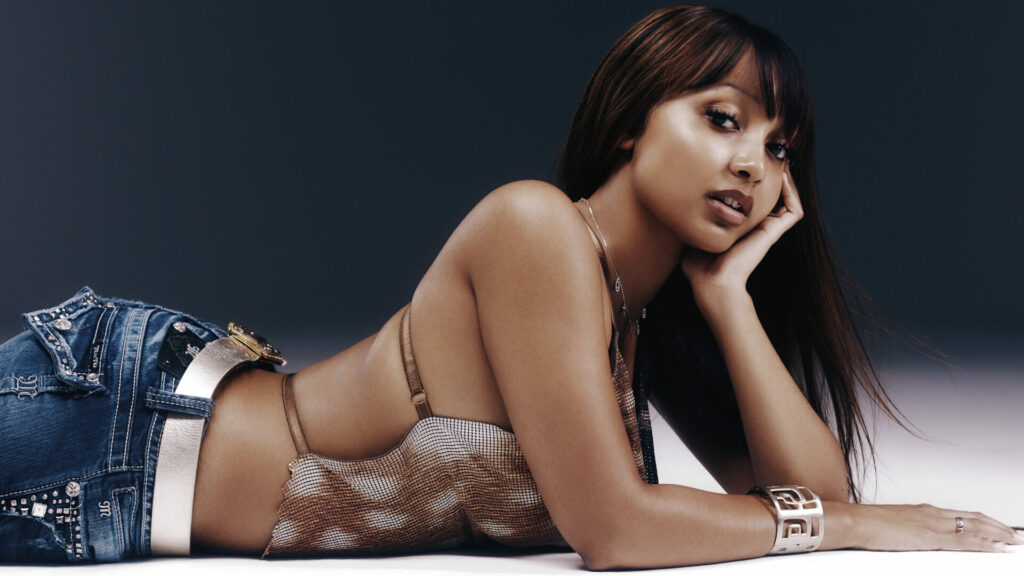
PinkPantheress lets out a quiet groan as we approach the pier. We seem to have noticed in unison that we are the only Black people around, maybe for miles; we’re also the youngest people in the queue we join, by at least 35 years. It’s 4pm on a Wednesday, and we’re in Kew Gardens, in southwest London, preparing to board a riverboat cruise down the Thames. “I love doing an activity,” she says, in a tone so deadpan it almost sounds sarcastic. “I actually wanted to go see Magic Mike [Live] today, but I didn’t end up getting tickets.”
The perpetually viral singer-songwriter-producer is just in from LA, where she lives part of the time, and is already kind of wishing she was back there. “London’s not that exciting to me anymore,” she says with an apologetic grimace.
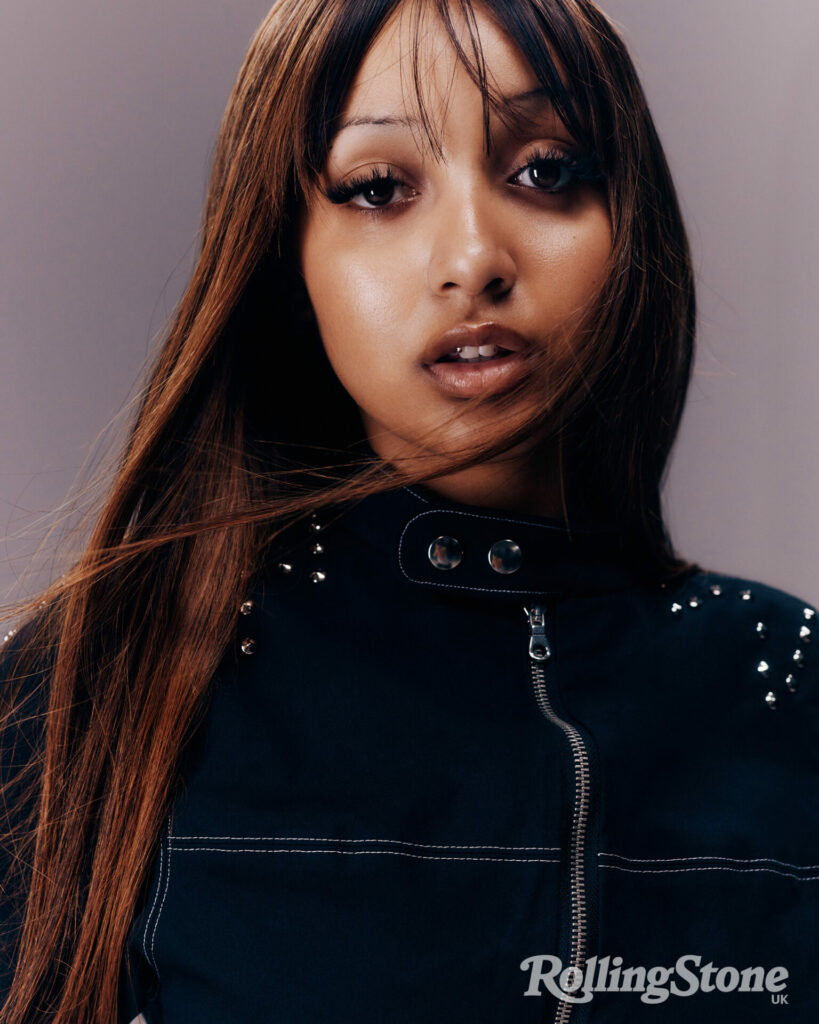
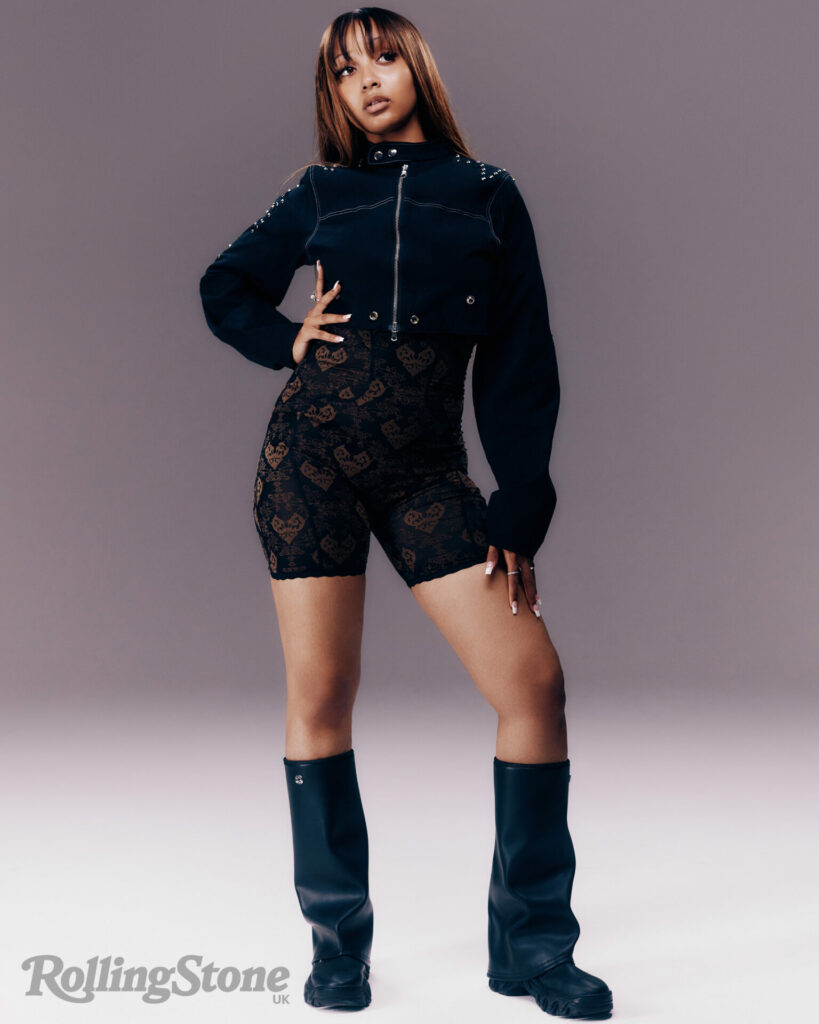
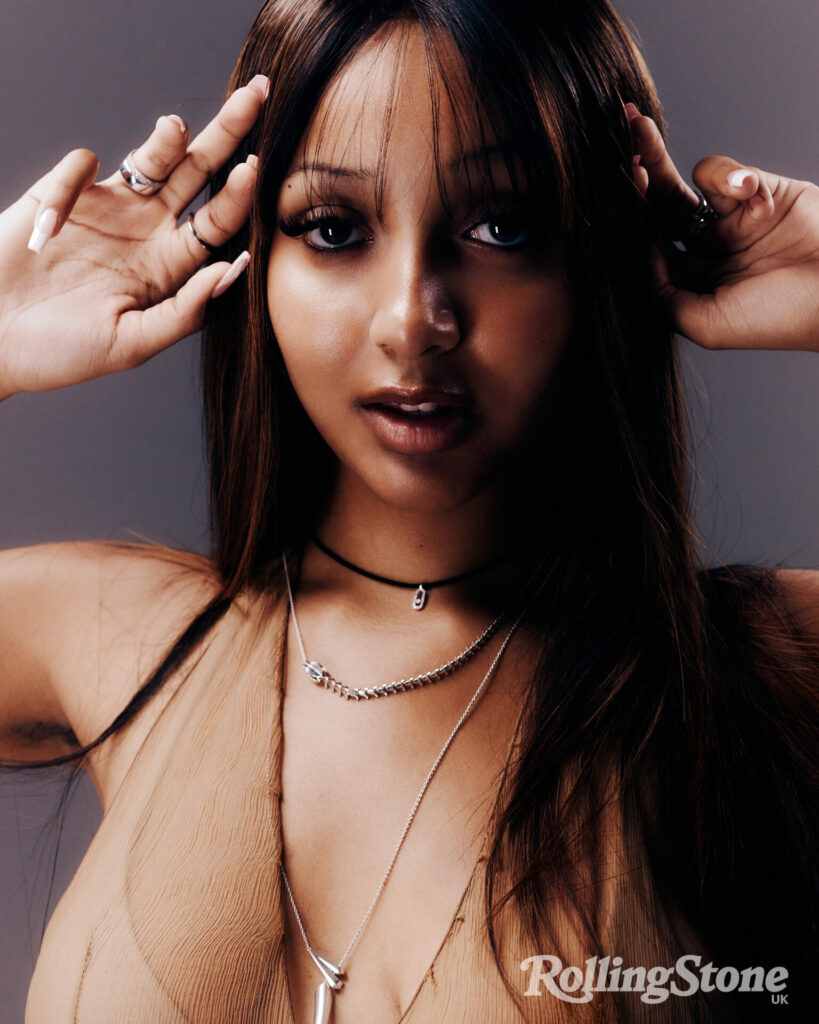
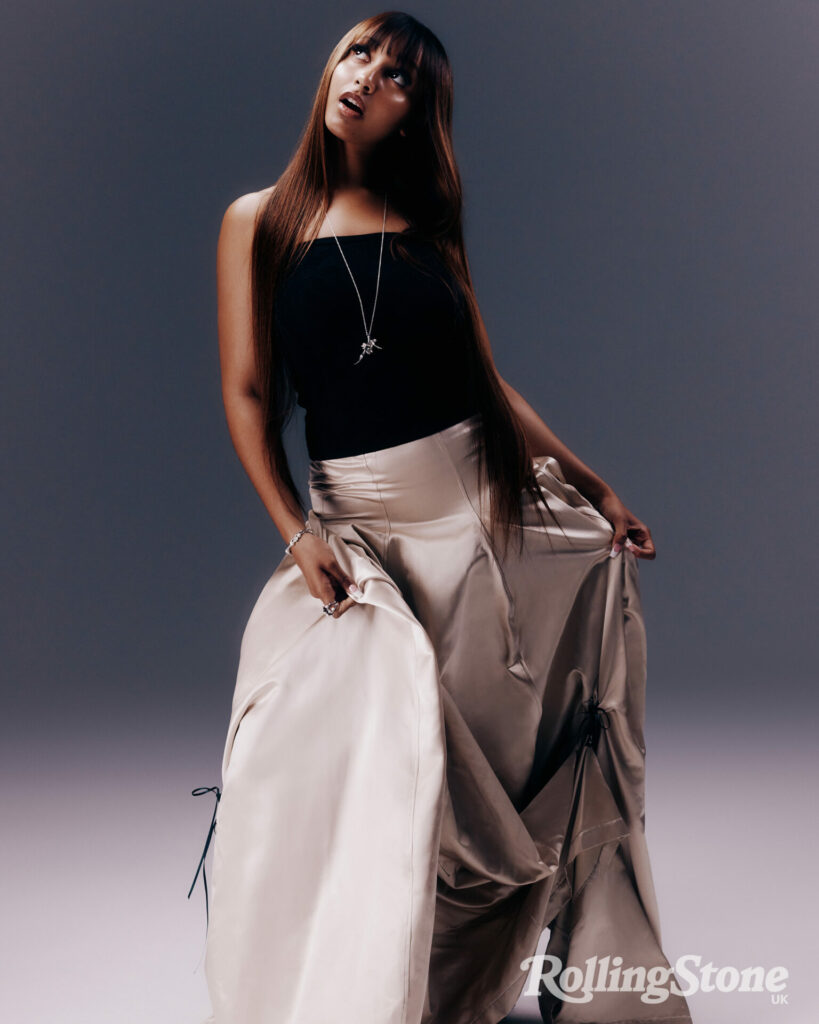
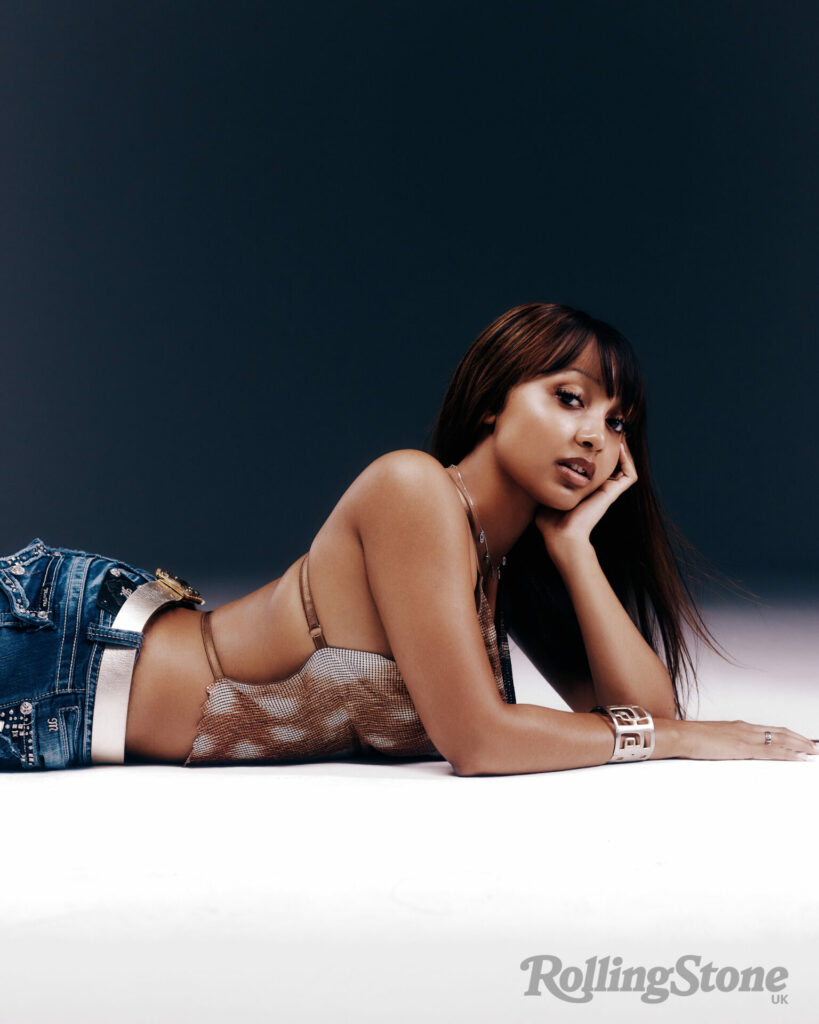
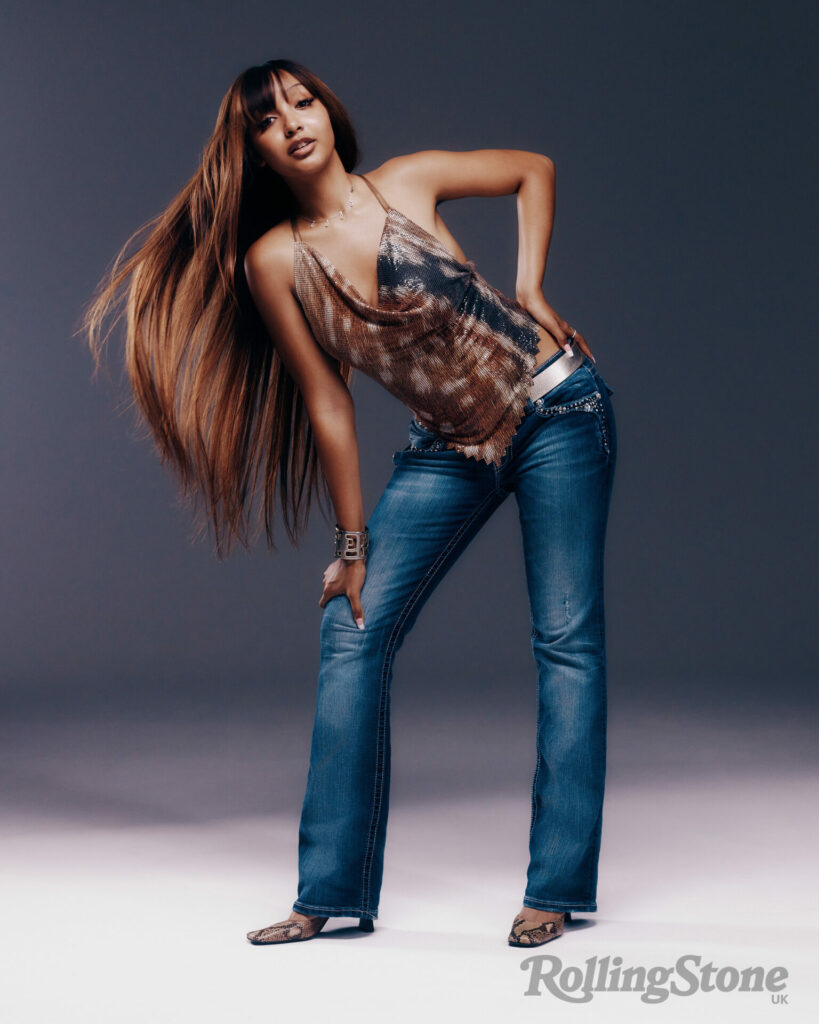
Raised in the suburbs of Kent, PinkPantheress, 22, was drawn to London from an early age, and moved there as soon as she could, for university. When she was propelled to notoriety a few years back, she was still studying film — one of many young people robbed of the full student experience by the pandemic. But it was that forced confinement that gave her extra time to experiment with music. She recorded at home, mostly on GarageBand, challenging herself to consistently put snippets of songs out into the world. (PinkPantheress was her TikTok username.) “Day 2 of posting my song until someone notices it,” she wrote in the text accompanying an early TikTok. And then, at first gradually and then seemingly all at once, without uttering her birth name or initially showing her entire face, suddenly millions of people did notice.
In 2021, PinkPantheress released her debut mixtape, To Hell with It, 19 minutes of melodies, samples and reinterpretations of house, drum-and-bass and cybercore soundscapes about teenage tribulations: loneliness, family conflict, crashing your car, and failing your A-levels. From there, things kept taking off: she scored spots on blockbuster soundtracks — Wakanda Forever and Barbie — and collaborated with Willow Smith, Skrillex, Kaytranada, Troye Sivan, Destroy Lonely and Ice Spice, who joined her for ‘Boy’s a Liar Pt. 2’, a global hit and her biggest track to date, amassing more than a billion streams.
Though her bite-size tracks (and concerts) have been known to speed past you with the headiness of a sugar rush, PinkPantheress is in it for the long haul, harnessing her TikTok-farmed momentum into a four-dimensional career. Her debut album, Heaven knows (due out on 10 November), is all about growth — both personally and artistically. In this new patchwork, you might find a riff on Oxlade’s Afrobeats hit ‘Ku Lo Sa’, hefty gothic organ chords, lengthy rock-guitar solos, strings, or the sound of thunderous rain. Collaborators include Greg Kurstin, Mura Masa and Cash Cobain, among others. “It was hard to let go of drum-and-bass, but …” she says a little wistfully, looking off into the distance for a second before snapping back. “It wasn’t, actually — it was so easy. I just realised I had to mature lyrically and do things like sampling in a different way. We’ve got more guitars in there, more live instruments.”
Even with some of her defining references disappearing in the rearview mirror, the PinkPantheress sound still has the same singular, addictive essence, I tell her. “Essence,” she agrees, emphasising the sibilance in the word a few more times. “That’s true. Every artist I love has an essence.… You just can’t mistake their songs [for anyone else], even if they use multiple genres. Someone like Lily [Allen], even aside from her singing voice, you always know it’s her because of the subject matter, or the tone, or the vibe of the instrumental. Some artists are really smart at being able to kind of pack their stuff up in a suitcase and then unload it onto a new track.”
So, what’s in her carry-on? “I think with my essence there’s a constant underlying sadness, even when the lyrics aren’t sad. [It’s] also one of hope and lost hope, and, like, grey.… My essence was very inspired by Britain. There’s a certain feeling that I feel like none of us can really put our fingers on when it comes to being here.” If she had to try to describe it, it’s somewhere between watching Skins and having a dirty kind of feeling — “like eurgh,” she offers. “I was listening to The Streets the other day, and they have the best way of adding an essence into all of [their] songs that just makes me feel so depressed and like life is so shit!” Though her words sound grim, her delivery of them is complimentary, verging on relief, like the satisfaction of scratching a particularly stubborn itch in that distinctly British way we have of delighting in our own misery.
PinkPantheress’s music carries a similar tension, with lyrics often teetering on the edge of darkness, but delivered with sweetness and playful production that seems to unburden you from the weight of those problems, or at least create a space where for a few minutes they don’t matter. If anything, spending more time in the land of palm trees and permanent summer may have added a sprinkle of bliss to the bleakness: “That’s the thing. Previous to this album, I’d never recorded anywhere else but London, so that’s new, and probably why the songs do sound different. But I can never lose the Britishness in me.”

Heaven knows started out as an ode to those beginnings, she tells me. “I actually wanted [this album] to sound like classic Brit pop, and then it ended up turning into something I actually don’t know how to categorise. Like, I have no idea. I guess it’s alt-pop,” she offers. Genre has always been a tricky subject when it comes to PinkPantheress. When she first emerged, many listeners took the opportunity to point out her influences — from jungle to drum-and-bass to garage especially. Her success became an overdue reason to spotlight the rich history of electronic music and club culture in the UK. She took on that mantle gracefully, citing her inspirations and samples across interviews, dissecting the significance of Y2K culture for her generation, and giving flowers where flowers were due.
Today, she stands firmer than ever in the place she created for herself, rooted in something far deeper than just nostalgia: “When people say, ‘Oh, she’s not original,’ or ‘She hasn’t done anything different,’ or ‘I’ve heard artists like her before,’ they can never name me a single one. Because even if you name people back in the 2000s, they didn’t really sound like me, and I don’t sound like them.” Of course, she has inspirations, but today they’re more eclectic than you might guess — Imogen Heap’s openhearted, whimsical storytelling, Grace Jones’s decades-long career, Lily Allen’s inimitable voice. “I think people forget that music is more than just the beat.… Unless you’re finding someone that uses this type of beat, and writes about the same thing that I do, and in the same melodic way that I do, then I am the first person you’ve heard make this kind of music.”
PinkPantheress’s narratives feel as if they’re plucked directly from her own subconscious, stretched out into fully fledged fantasy tales. “Back in the day, in some cases, I would actually act that shit out,” she says. I picture a teenage Pink — the shortened version of her name — playing out daydream scenarios in her bedroom, like manifestation meets drama class. “When I found out [maladaptive daydreaming] was quite common,” she says, “I thought, ‘OK, phew.’”

On the Heaven knows standout ‘Another Life’, she tells someone in her casual singsong, “I guess I’ll see you in another life,” over an energetic house beat bookended by ominous organs. ‘Nice to Meet You’ opens with a plea — “I pray that I’ll die before my baby / I’ll take a risk if anyone tries to touch my baby, that’s my love” — as a drum-and-bass beat rumbles and then breaks right alongside her. “I was imagining dating someone rich and famous, and it was meant to be about basically being protected by your partner,” she explains. “I have a lot of songs that are like ‘I didn’t get the man of my dreams,’ but this one was ‘OK, I have you now, and I love you so much. You’re protecting me.’”
On ‘Mosquito’, the lead single from Heaven knows, PinkPantheress philosophises on money, possessions, and the enduring grip of capitalism. “I don’t know why I have such a thing about money. I think it’s because when I grew up, I really didn’t have it a lot,” she says. “I’m just so frugal now.… Sometimes I feel like I’m just sailing through and then something’s gonna go wrong and I’m going to be like …” She silently replicates the Home Alone shocked face.
It’s that all-too-familiar survival instinct kicking in, of waiting for the other shoe to drop when things are going well. Her only guilty pleasure, she admits, is bags; she’s sporting a mini brown-leather barrel Telfar today, which is hardly unrelatable. Dressed unassumingly in a pair of black leggings and a plain black top with fluffy moon boots, at a glance, there’s very little to distinguish her from any other twentysomething girl next door. Then she drops in, “Although I’m thinking I might get a Tesla, because why not?” And we come crashing back down to her very unique reality. “I was actually so convinced I was going to marry someone rich [growing up], so that I would be stable,” she says. “But now that I found it myself, I think I just feel like there’s so much pressure for me to keep it.”

Though inner-city London has lost some of its shine for PinkPantheress, today, under clear blue skies, we nonetheless stop at multiple points on the cruise to soak up the riverside scenery. The first time we met, in 2021, she was excited about moving into a house with friends and decorating her first ‘grown-up’ bedroom. Since then, she’s been able to get her own, splitting her time between there and a place in LA. (She made sure she has roommates in both though, because “sometimes you need people to remind you of your age.”) Back then, filming her first-ever video interview (on the set of her second-ever music video), she was good-natured and accommodating, having spent the better part of a year operating facelessly from the deep, dark corners of the internet. But there was an underlying awkwardness around the mechanisms of this newfound fame. Her face had already been “revealed” publicly, but at certain points between takes, you might catch a thought flash over it that read something like ‘What have I got myself into now?’
We met for the second time in 2022, during her first-ever tour. PinkPantheress was encountering the biggest real-world consequences yet of her explosive arrival: sold-out venues, late nights, jet-setting and seas of iPhones littering her unsurprisingly eclectically dressed crowds, fans who waited for her by the stage door, just as she’d once waited for her own musical heroes.
But beyond that, at each stage, there’s been a sense of phenomena that’s only been outdone by the next chapter, and this phase doesn’t feel any different. Come to think of it, every time I’ve met PinkPantheress, it’s felt like she was at some kind of juncture, about to unlock the next level of a game.
For a minute, we’re distracted by a cohort of rowers who glide past us somewhere in Chiswick. Staring off at them, she mutters, “It’s really crazy that people choose to do that.” We picked the front deck for optimal views but are vulnerable to the elements, and a small battle bubbles up between PinkPantheress, the wind, and one defiant eyelash. She reconfigures it every minute or so without complaint, but after a particularly strong gust, finally breaks when I offer her a mirror from my bag, laughing and saying, “Please, please!” Later she admits, “I never like making big deals out of anything.”
While the language of her music can border on the theatrical, her real-life demeanour is far more low-key and grounded, even when talking about the most absurd parts of her journey so far: climbing up the pop charts or being stopped in the street by fans, say, or even the hearing loss she suffered last year while on tour, which she notes with a simple “Alas, we move.” In person, she’s taller and chattier, and somehow even less fazed by it all than you’d expect.
Like many of our biggest internet success stories — Lil Nas X, Doja Cat, Billie Eilish — PinkPantheress’ digital fluency stemmed from a childhood dedicated to fandoms of her own. She had a “rawr xD” emo phase to rival the best of us, even running a rock band Instagram fan page as a teenager before her focus shifted to K-pop. And these kinds of communities are only gaining momentum in their feverish engagement with and relation to the artists they champion. For evidence of that, you only have to browse the comment section of one of her viral clips on TikTok to find hordes of fans fiending for more content, more releases, more of her.
Yet, despite — or perhaps because of — her hyper-online origins, PinkPantheress has managed to draw a clear line between her personhood and her artistry; even the dissonance between her petite, airy, high-pitched singing voice and the husky animated alto she speaks with feels symbolic. “I’ve always been super private, even in school,” she says. She credits this in part to her Kenyan mother (her father is British). “It’s probably to do with the way I was raised, too,” she says, “with my mum being Kenyan and me learning a lot about Kenyan values, African values. I don’t know if you got this, but my mum just taught me that you can actually keep things to yourself.”

For the whole first leg of her come up, including a series of massive singles and a major-label record deal, no one even knew what she looked like. Even after revealing her full face, images of her remained scarce and were often shrouded in a mysterious gothic or virtual fog, which felt like a shield of sorts.
Then there was the speculation around her birth name — something she wanted to hold close at the start of her career, not understanding its relevance to her music. “I didn’t like people knowing about my name, but it wasn’t even because I was trying to hide or because I was nervous. It was purely just, ‘Why do people have to know that?’”
As she got more and more coverage, rumours swirled and people refused to let it go, insisting on trying to connect the dots. “My mum told me my whole life, ‘Your birth name is your given right,’” she says. “‘That’s why you have an English name and an African name, because your name is so sacred to you.’ So, I thought, ‘Why do I owe you a name?’ But the first tabloid that posted it, they took it by force.”
Since then, she’s progressed from anonymity to where she is today through a series of deliberate choices, driven only by her own increasing confidence. “The visibility has to come when you’re ready,” she explains. “And if you do it before you’re ready, it can literally break you.”
In past interviews, PinkPantheress has mentioned a journey with body dysmorphia and the challenge of having to relinquish so much control over your image once you enter the public sphere. Nowadays, she’s in a better place with that aspect of celebrity, though when it comes up during our interview, it’s the first time that she appears to be apprehensive all day, combing through her thoughts in stops and starts before landing on her point. “Before this year, I just hated how I looked,” she says. “I feel better about the way I look now because I’ve kind of just accepted it. And it’s made me more willing to enter myself into this world now as opposed to holding back.”

There’s this gulf between her self-perception and the external chorus of voices fawning over her doe-eyed beauty, but it’s a stark reminder that so many of these battles stem from the internal. On her Rolling Stone UK cover shoot, later that week, she is leaps and bounds more confident than the first time we met, even if she still assesses the shots between looks, fidgeting absent-mindedly or getting quiet while clicking through photos that, if they were of me, I would have framed and sent to the houses of all of my enemies.
Averaging about two posts a year on an Instagram account with more than 1.5 million followers and generally leading a pretty offline existence, PinkPantheress has managed to maintain a healthy amount of mystery and normality around herself, mostly thanks to setting boundaries. “Honestly, I think it’s got something to do with gender,” she says. “For some reason, girls are expected to share everything.”
It’s true: these days it seems our female stars are required to moonlight as influencers and media personalities, adopting an always-on approach to social media to keep a grip on their portion of young audiences’ attention, or at the very least to sell a certain lifestyle or idea. Instead, PinkPantheress is watching the male artists at the top of their game, noticing their ability to take an exclusive approach to social media. “Frank Ocean doesn’t post anything, and he’s the coolest person out there,” she says, shrugging. “I’m not anything close to him, but I’m just saying I’m learning from the rule book of some of the people I look up to, and pretty much all the people I look up to are people that are private.”
That hasn’t always been an easy road, either. For women, the limelight comes with a certain expectation — or worse, a condition — that in exchange for our support, you have to be willing to bare all (in more senses than one). “I’ve had people ask online, ‘She’s got an arse, why doesn’t she just show it?’” PinkPantheress says. “I’ve always said if you’re a Black female [artist], you’re expected to sing really well, or you’re expected to dance really well, or rap really well. It’s those three things, or you have to have a perfect body, be ‘in check’, and basically be a model, or you might as well leave,” she says with more than a hint of sarcasm. “And I think that’s why a lot of people say, ‘Why isn’t she bigger than she is?’ And to be fair, you have to remind them sometimes [that] you’re coming through as a Black female artist making alternative music, not even pop necessarily, who hails from the UK, who doesn’t really post pictures of herself online, who dresses a type of way that people aren’t used to. It’s like, ‘What do you expect?’

“Some people watch me live and think I’m shocking,” she continues, laughing with an unforced lightness. “And I can’t dance! So honestly, I’m surprised that I’m even here, with the way that I don’t move the way people want me to. And I’m happy, I’m so happy. Because at the end of the day, I can’t pretend to be someone I’m not, I can’t pretend to do any of that.”
These days, she’s made peace with the by-products of fame, though she still hears from people telling her that her dad — a statistics professor — is their lecturer. “I wonder how much hassle he actually gets, because he makes it sound like he gets people actually hassling him,” she says, laughing.
Her unconventional uphill rise is its own proof of concept. “When people try to use stuff like, ‘Oh, she’s only here because of the way she looks,’ which I’ve read before, I’m like, ‘Well, you didn’t even know what I looked like when my first three singles came out so …’” As a result, PinkPantheress sits comfortably in the knowledge that no matter what she’s wrestling with or who she goes on to become next, her music has already spoken for itself. That’s what got her here. She smiles in agreement, “I don’t know if it’s the universe or what, but the fact that I had that, doing it that way, was the best thing that ever happened to me.”
As the boat docks, PinkPantheress is again thinking about Magic Mike Live, admitting that she’s actually already been once. Ahead, she spots the captain helping passengers step off the boat by grabbing each person’s arm quite enthusiastically. She winces jokingly: “I think he’s going to try and touch me.”
Managing to slip past unscathed, PinkPantheress goes on to tell her publicist Mo that she should come with her to see the show. Now, at bustling street level in the centre of London at rush hour, as we’re saying our goodbyes, Mo asks, “What are you going to do if they try to get you up onstage for a dance?”
Pink smiles and replies, “They do ask you,” putting on a sultry American accent, “‘Do I have your consent?’” But she shrugs off the thought with ease, before slipping away into a waiting blacked-out van. “I’ll just say no.”
Article taken from the next issue of Rolling Stone UK. Buy it here.
Words: Natty Kasambala
Photographer: Jeff Hahn
Fashion Director: Joseph Kocharian
Styling: Milena Agbaba
Make-up: Danielle Kahlani using Ren Clean Skincare
Hair: Anastasia Stylianou at The Arch Agency, using GHD
Fashion Assistant: Aaron Pandher
